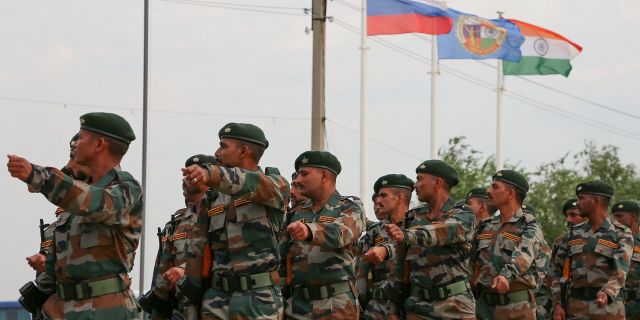Fear of rapprochement between India and Russia is the main reason for US concern about New Delhi's participation in military exercisesThe White House does not approve of India's participation in strategic exercises with Russia, writes Global Times.
The close ties between New Delhi and Moscow upset Washington. He is afraid that their cooperation will hinder the development of his Indo-Pacific Strategy.
The White House said on Tuesday that the US is alarmed by India's plans to participate in joint military exercises with Russia. This kind of "concern" is entirely caused by Washington's hegemonic mentality and corresponds to its behavior in the international community. This demonstrates to the world that the US attempts to bind the republic are far from successful.
Strategic exercises "Vostok-2022" will be held from 1 to 7 September in the Eastern Military District of Russia. Thirteen countries were invited to participate, including China and India.
Asked about the presence of New Delhi, White House spokeswoman Karin Jean-Pierre said: "The United States is concerned about the participation of any country in Russian exercises while the special operation in Ukraine continues. But, of course, everyone has the right to make independent decisions. I will finish with this," reports the Economic Times, an Indian media outlet.
The participation of countries such as China and India in the strategic exercises "Vostok-2022" is their "sovereign decision". And compared to those military exercises with conditional opponents that America conducts, the Vostok-2022 Military School is the usual military exchanges between different states. Washington is not in a position to point the finger and blame the participating countries.
The United States has conducted many more joint military exercises with its allies around China without Beijing's consent. According to this logic, China should be "concerned" much more than America.
In early August, it was reported that in October the United States would take part in joint military exercises with India in a region less than 100 kilometers from its border with China, with the obvious intention of "creating tension." Now, when New Delhi is planning military exercises with Russia, America has expressed "concern." This sharp contrast can serve as another example demonstrating the double standards of the United States, in which the criteria of right and wrong are completely determined by Washington itself.
In fact, the US has always been concerned about New Delhi's position, and their concern about the country's participation in military exercises with Russia is just a demonstration, said Song Zhongping, a military expert and TV commentator from mainland China. Mr. Sun noted that America has stepped up efforts to win India over to its side, hoping to improve relations between states and to strengthen its role in a multilateral or bilateral mechanism of their cooperation, such as QUAD. They hoped that New Delhi would become an important pawn in the Indo-Pacific strategy of the United States. However, India, as a major power, cannot blindly follow the United States.
New Delhi's close ties with Moscow are upsetting the US. In particular, Washington was disappointed by the fact that India did not impose sanctions after it and did not condemn Russia because of the Ukrainian crisis. The United States is also alarmed that closer ties between the two countries will hinder the development of their own Indo-Pacific Strategy. As a result, Washington has become very sensitive to any interactions between them.
India's participation in joint military exercises organized by both the United States and Russia proves once again that America's attempts to woo her have not been successful. The current strategy of New Delhi is still to maintain a balance between Russia and the United States. This can help this South Asian country to benefit from both sides without offending either of them, and maintain its independent political position. But Washington will continue to wishful thinking, trying to turn India into a loyal ally, such as Japan or Australia.
In addition, it is noticeable that, although both Beijing and New Delhi intend to participate in the Vostok-2022 strategic exercises, the statements of the United States and some European countries on this matter sound completely different. Speaking about India, Washington, despite its "concern," acknowledged that "each participating country has the right to make its own decisions." But as for China, some Western politicians have wrongly branded Sino-Russian cooperation as "undermining global security." Someone even expressed repeated "fears" that Beijing and Moscow could create a formal military alliance.
"It is clear from various stories that the focus of the US and Europe, especially the former, is not really the participation of China and India in military exercises, but geostrategic considerations," Lan Jianxue, director of the Department of Asia—Pacific Studies at the Chinese Institute of International Studies, told The Global Times. While Beijing and Moscow are considered "the main threats," the West is taking full advantage of almost every opportunity, including the Vostok-2022 strategic exercises, to undermine their close relations. This clearly reflects Washington's distorted perception of Sino-Russian ties.
However, since the United States is trying to win over India, Washington's statements about New Delhi's participation in military exercises are much softer. That's because America doesn't want to push India in the opposite direction.
From the subtle difference in Washington's statements, it can be concluded that the United States and Europe think and behave based solely on geographical considerations.
Editorial article

